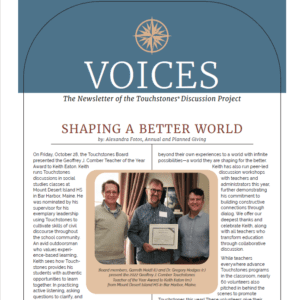By Howard Zeiderman
Sometimes a name is uncanny. Such is the case with the Touchstones-National Endowment for Humanities (NEH) veterans’ program: Completing the Odyssey: A Journey Home. As Odysseus himself discovered, homecoming is not merely finding a geographical place but is a creative act of building a new emotional place for himself with those whom he loves. It is not a static situation but a fluid and evolving reality. Likewise, our work developing this program has been a journey. As experts in discussion programs, our path in program development has entailed learning from veterans who are expert with knowledge of barriers to homecoming. They know first-hand the trials associated with a return to civilian roles after life in the service. In true Touchstones fashion, this program has been as much a reciprocal learning process as it has been a reciprocal teaching one.
Three veterans, Joe Smith, Stephanie Morgan, and Cole Caudle broke a cardinal military rule never to volunteer. They volunteered first. In 2017, when Touchstones first received a grant from the NEH to develop this program, Joe, Stephanie, and Cole started the process of preparing to lead other veterans because they know the importance and difficulties of reintegration after separation from service. Equally valuable to the program’s success, they knew that skills veterans acquire in service must be available to civilian society. Along the way, they discovered how Touchstones offers a rare and unique chance for them to explore ideas and experiences with peers on the road to forming a new understanding of community.
Joe, an Army veteran who served in the Vietnam War, helped us understand that too often vets keep their experiences to themselves. He clarified ways in which full participation in discussion is essential, which helped us understand better the need for accessible texts from The Odyssey and specific accounts by more contemporary veterans. While one offers historical distance from personal experience, the others help veterans connect more deeply and explore their own perspectives.
Cole, a Marine Corps veteran with two tours in Afghanistan, knew the importance of collaboration and thinking outside the box. He never lets us forget how small group work in Touchstones is invaluable in building trust and instilling listening skills and sharing power. Cole brought our attention to the risk, and therefore courage, required to listen to another person. This type of listening is the most important precondition for collaboration.
Stephanie, also a Marine Corps veteran, focused us on always attending to and assessing the present situation one faces. Her military training alerted her to the vital role that precise and explicit assessment of successes and problems in discussion dynamics play in group formation and increasingly collaborative leadership. She helped us recognize more fully how integral the self and group evaluation are to our processes at Touchstones. And she sensitized us through her own actions to see how one learns to tailor one’s evaluations to what others can absorb and understand.
As we start a new round of Completing the Odyssey on Sept. 11, we are thankful that these veterans took and continue taking the risk to share their thoughts and offer input that enables us to create a program that is a living, joint effort. Stay tuned for more updates from the field.



 Join the
Join the